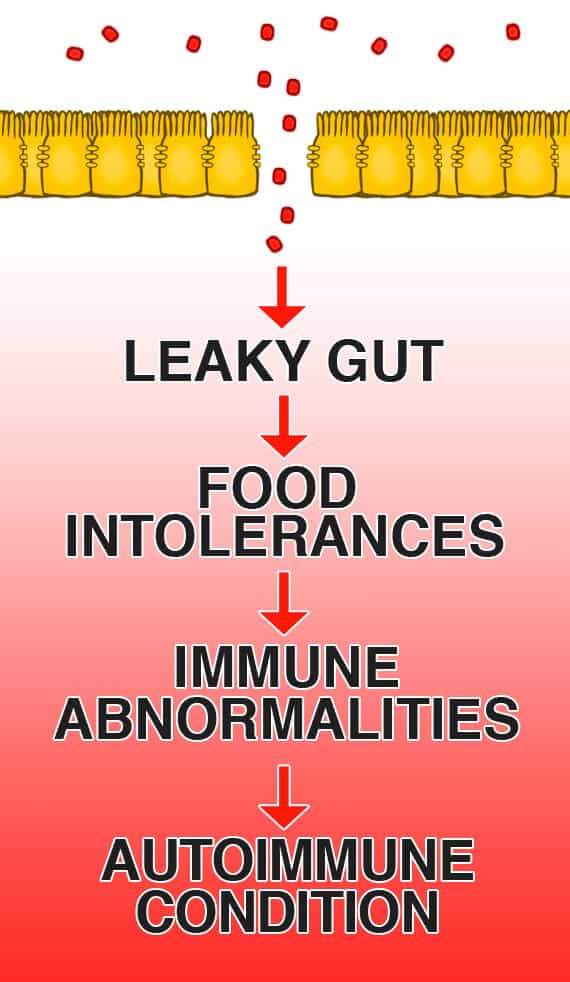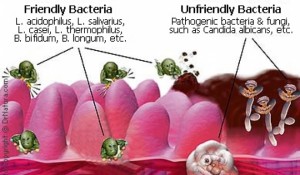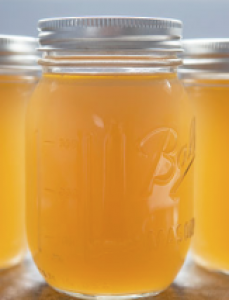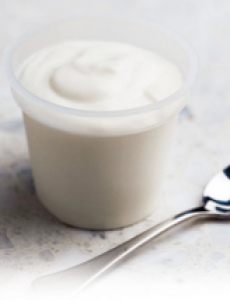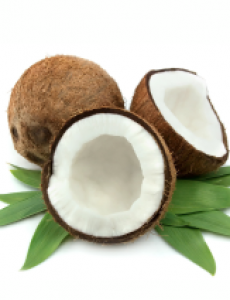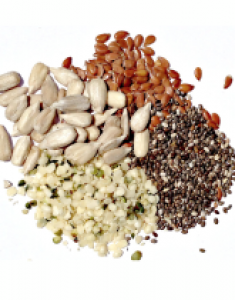Leaky gut syndrome is a rapidly growing condition that millions of people are struggling with and don't even know it. From the sound of it, you might think leaky gut only affects the digestive system, but in reality it can lead to many other health conditions.
According to research, leaky gut could be the cause of your food allergies, low energy, joint pain, thyroid disease, autoimmune conditions and slow metabolism.
In this article I will outline specifically how you can heal leaky gut syndrome and breakthrough the health problems you've been struggling with.
What is Leaky Gut Syndrome?
Think of the lining of your digestive tract like a net with extremely small holes in it that only allow specific substances to pass through. Your gut lining works as a barrier keeping out bigger particles that can damage your system.
When someone has leaky gut (often referred to as increased intestinal permeability) the "net" in your digestive tract gets damaged, which causes even bigger holes to develop in your net, so things that normally can't pass through, are now be able to. Some of the things that can now pass through include proteins like gluten, bad bacteria and undigested foods particles. Toxic waste can also leak from the inside of your intestinal wall into your blood stream causing an immune reaction.1
Leaky Gut Symptoms and Progression
This leads to inflammation throughout your system and can cause symptoms, such as:
Thyroid conditions
Fatigue
Joint pain
Skin issues, like rosacea and acne
Digestive problems
Weight gain
Syndrome X
One of the biggest warning signs that you may have leaky gut can be that you're experiencing multiple food sensitivities. Partially digested protein and fat can seep through your intestinal lining making their way into your bloodstream which will cause an allergic response.
This allergic response doesn't mean you'll break out in a rash all over your body, but it can lead to one of the symptoms mentioned above. If left un-repaired, it can lead to more severe health issues like inflammatory bowel disease, IBS, arthritis, eczema,2 psoriasis,3 depression, anxiety, migraine headaches, muscle pain and chronic fatigue.
According to the Journal of Diabetes there is a strong body of evidence pointing to leaky gut as a major cause of autoimmune diseases, including Type 1 Diabetes.4
Another problem with leaky gut is that it can cause malabsorption of vital minerals and nutrients including zinc, iron and vitamin B12.
What Causes Leaky Gut?
There are 4 main causes of leaky gut which include:
Poor diet
Chronic stress
Toxin overload
Bacterial imbalance.5
We're about to cover some in-depth nutrition here. Read carefully, and in a few sections I will outline the top 5 Foods and Supplements to heal your leaky gut ...
The most common components of food that can damage your intestinal lining are the proteins found in un-sprouted grains, sugar, GMO's, and conventional dairy.
The problem with unsprouted grains is they contain large amounts of nutrient blockers called phytates and lectins. Lectins are sugar-binding proteins that act as a natural defense system for plants that protect them from outside invaders like mold and parasites.
This is good news for plants but bad news for your body.
Your digestive lining is covered with sugar containing cells that help break down your food. Lectins gravitate toward this area and when they attach to your digestive lining it damages your gut, causing inflammation.
Lectins and Foods that Cause Leaky Gut
Lectins are found in many foods, not just grains. If consumed in smaller amounts, your body will do just fine with them. But foods that have large amounts of lectins, like wheat, rice, spelt, and soy, are more problematic.
Sprouting and fermenting grains reduces phytates and lectins, and makes these foods easier to digest.
GMO and hybridized foods tend to be the highest in lectins since they have been modified to fight off bugs.
Also, gluten containing grains will damage your intestinal lining causing leaky gut. So while you are working to heal your system stay away from all grains especially ones that contain gluten like wheat. Once your gut is healthy you can add back in grains that have been fermented and sprouted to eat occasionally.
Conventional cows milk is another food that can cause leaky gut. The component of dairy that will harm your gut is the protein A1 Casein. Also, the pasteurization process will destroy vital enzymes making sugars like lactose very difficult to digest. For this reason, I only recommend buying dairy that is raw and from: A2 cows, goat's, sheep, or buffalo.
Sugar is another substance that will wreak havoc on your digestive system. Sugar will feed the growth of yeast, candida, and bad bacteria which will further damage your gut. Bad bacteria actually creates toxins called exotoxins that damage healthy cells and can eat a hole into your intestinal wall.
Other Factors that Cause Leaky Gut
Chronic Stress - Chronic stress weakens your immune system over time which cripples your ability to fight off foreign invaders, like bad bacteria and viruses leading to inflammation and leaky gut. To reduce stress I recommend getting more sleep, schedule fun into your week, rest one day a week, meditate on scripture, and hang out with positive, uplifting people.
Toxins - We come into contact with over 80,000 chemicals and toxins every single year, but the worst offenders for causing leaky gut include antibiotics, pesticides, tap water, aspirin, and NSAIDS. I recommend buying a high quality water filter to eliminate chlorine and fluoride and look to natural plant based herbs to reduce inflammation in your body.
Dysbiosis - Finally, one of the leading causes of leaky gut is a condition called dysbiosis, which means an imbalance between beneficial and harmful species of bacteria in your gut. For many, this imbalance can begin at birth because of a C-section or because the mother didn't have a healthy gut herself. The overuse of prescription antibiotic drugs, tap water with chlorine and fluoride, and the lack of probiotic rich foods contribute to this imbalance of good and bad bacteria.
Leaky Gut and the Brain
Another topic I want to quickly discuss is how leaky gut can affect the brain. If you've ever seen a child with autism experience a mood swing, this can be caused by intestinal permeability. Gluten and Casein-Free Diet's have proven effective for many children with autism because these proteins can leak through the gut and then recirculate and act on the brain similarly to an opioid drug.
This is also why leaky gut has been linked to other psychological disorders such as anxiety, depression and bipolar disorder. So, in many cases, if you can heal the gut you can heal the brain.
The 4-Step Plan to Heal Leaky Gut
The good news is there's a solution to healing leaky gut. There is a four step process that includes:
REMOVE foods and factors that damage the gut
REPLACE with healing foods
REPAIR with specific supplements
REBALANCE with probiotics
Here's the protocol I have used with my patients over the years that has helped them see incredible results.
Remember, the top foods to remove that cause leaky gut are sugar, grains, conventional meat, conventional dairy and GMO foods. The top toxic exposures to eliminate are tap water, pesticides, NSAIDS, and antibiotics but remember to always consult with your physician if he has prescribed these for you.
The Leaky Gut Diet and 5 Healing Foods
#1 Bone Broth - Bone broth contains collagen and the amino acids proline and glycine that can help heal your damaged cell walls. I've had many of my patients do a bone broth fast for 3 days to help rapidly repair leaky gut.
#2 Raw Cultured Dairy - contains both probiotics and SCFA's that can help heal the gut. Pastured kefir, yogurt, amasai, butter, and raw cheese are some of the best.
#3 Fermented Vegetables - contain organic acids that balance intestinal pH and probiotics to support the gut. Sauerkraut, Kimchi, and Kvass are excellent sources.
#4 Coconut Products – All coconut products are especially good for your gut. The MCFA's in coconut are easier to digest than other fats so better for leaky gut. Also, coconut kefir contains probiotics that support your digestive system.
#5 Sprouted seeds – Chia seeds, flaxseeds, and hemp seeds that have been sprouted are great sources of fiber that can help support the growth of beneficial bacteria. But if you have severe leaky gut, you may need to start out getting your fiber from steamed vegetables and fruit.
Also, consuming foods that have anti-inflammatory Omega-3 fats are beneficial such as grass-fed beef, lamb, and wild caught fish like salmon.
Top 5 Supplements for Healing Leaky Gut
There are many supplements that support your digestive health but I believe the most beneficial are: L-Glutamine, Probiotics, Digestive Enzymes, Aloe Vera Juice, and Licorice Root.
1. Probiotics - Probiotics are the most important supplement to take because it helps replenish good bacteria and crowds out bad bacteria. I recommend getting probiotics in both food and supplement form. I see people all the time only follow part of the protocol in healing their gut by removing the damaging irritants. But the part they often leave out is re-inoculating their gut with beneficial bacteria that will keep bad bacteria at bay.
So load up on BOTH probiotic rich foods and take AT LEAST 50 billion units of probiotics daily from a high quality brand.
2. Digestive Enzymes - Digestive Enzymes (one or two capsules at the beginning of each meal) ensure that foods are fully digested, decreasing the chance that partially digested foods particles and proteins from damaging your gut wall.
3. L-Glutamine - L-Glutamine is critical for any program designed to heal leaky gut. Glutamine is an essential amino acid that is anti-inflammatory and necessary for the growth and repair of your intestinal lining. L-glutamine acts a protector and coats your cell walls, acting as a repellent to irritants. Take 2-5 grams 2x daily.6
4. Licorice Root (DGL) - Licorice root is an adaptogenic herb that helps balance cortisol levels and improves acid production in the stomach. DGL supports the body's natural processes for maintaining the mucosal lining of the stomach and duodenum. This herb is especially beneficial if someone's leaky gut is being caused by emotional stress. Take 500mg 2x daily.
5. Quercetin - Quercetin has also been shown to improve gut barrier function by sealing the gut because it supports creation of tight junction proteins. It also stabilizes mast cells and reduces the release of histamine which is common in food intolerance. New studies have also shown it's effectiveness in healing ulcerative colitis. Take 500mg 3x daily with meals.
If you can follow the above protocol you are well on your way to healing your gut for good!
References:
You can also read the article here.

